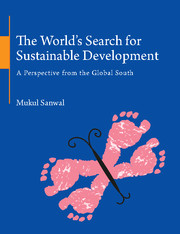Book contents
- Frontmatter
- Dedication
- Contents
- Preface
- Acknowledgments
- Abbreviations
- INTRODUCTION
- 1 Social Dimension of Sustainability
- CONSUMPTION IN AN UNEQUAL WORLD: FRAMING INTERNATIONAL COOPERATION
- 2 Geopolitics of the Global Environment
- 3 Natural Science – Policy – Institutions Interface
- 4 Focus on Developing Countries
- 5 Limitations of Multilateral Environmental Agreements
- CLIMATE POLICY: GLOBAL TO NATIONAL
- SUSTAINABLE DEVELOPMENT: NATIONAL TO GLOBAL
- CONSUMPTION IN A MORE EQUAL WORLD: SHAPING SOCIETAL FUNCTIONS
- GEOPOLITICS TO GEOECONOMICS: RURAL–URBAN DIVIDE, RATHER THAN BETWEEN COUNTRIES
- THE ASIAN CENTURY
- Index
4 - Focus on Developing Countries
from CONSUMPTION IN AN UNEQUAL WORLD: FRAMING INTERNATIONAL COOPERATION
Published online by Cambridge University Press: 18 December 2015
- Frontmatter
- Dedication
- Contents
- Preface
- Acknowledgments
- Abbreviations
- INTRODUCTION
- 1 Social Dimension of Sustainability
- CONSUMPTION IN AN UNEQUAL WORLD: FRAMING INTERNATIONAL COOPERATION
- 2 Geopolitics of the Global Environment
- 3 Natural Science – Policy – Institutions Interface
- 4 Focus on Developing Countries
- 5 Limitations of Multilateral Environmental Agreements
- CLIMATE POLICY: GLOBAL TO NATIONAL
- SUSTAINABLE DEVELOPMENT: NATIONAL TO GLOBAL
- CONSUMPTION IN A MORE EQUAL WORLD: SHAPING SOCIETAL FUNCTIONS
- GEOPOLITICS TO GEOECONOMICS: RURAL–URBAN DIVIDE, RATHER THAN BETWEEN COUNTRIES
- THE ASIAN CENTURY
- Index
Summary
The institutional framework and the rules under which global environmental change, climate change and sustainable development policy evolved have failed to give legitimacy to the shape of the response. This has led to continuing differences on the nature and scope of international cooperation between countries at different levels of development.
The way the issue was framed reflected the interests and concerns of the United States, and other industrialized countries, as the developing countries focused primarily on the means of implementation. The United Nations facilitated a consensus by developing a common understanding around the science as it was developed in industrialized countries and supported the positions they were taking. The divide was bridged with the argument that long-term development was necessary to combat the poverty that contributed to pollution and that such growth also depended on dealing with short-term environmental problems. Increased resources to apply to a global problem, characterized as ‘additionality’, helped overcome concerns related to global economic inequities.
The common understanding of global environmental change was shaped by deliberations within the United Nations reflecting its planetary dimensions, multilateral character and relation to national policy. From the beginning, there has been a tension in combining growing concerns on a range of global environmental issues with equally severe existing national socio-economic issues, and this dichotomy continues till today. A political perspective was adopted in 1972 to shift attention from the consequences of the industrial revolution and the movement of three-fourth of the population from rural to urban areas in industrialized countries, which had led to certain consumption patterns with a significant global impact. The issue was defined as a scientific and technical concern rather than dealing with the activities that led to the problems, that is, unsustainable consumption and production patterns.
The objective of first World Conference on the Human Environment, in 1972, was to take political decisions for international cooperation in the context of the use of natural resources with an environmental impact beyond the limits of national jurisdiction. As the United Nations observed, the delicately balanced life support systems were already overtaxed [United Nations Press Note, 1972]. While there was no common understanding on how this problem concerned all nations, participation of developing countries implied their acceptance of interdependence in patterns of natural resource use.
- Type
- Chapter
- Information
- The World's Search for Sustainable DevelopmentA Perspective from the Global South, pp. 72 - 93Publisher: Cambridge University PressPrint publication year: 2015

